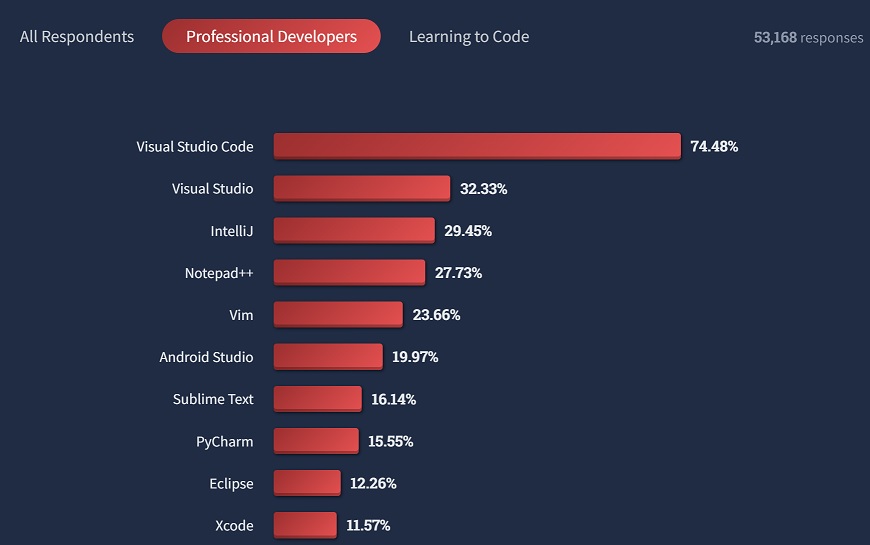
Stack Overflow has published its latest developer survey. This annual analysis is among the most useful for tracking development trends, thanks both to its size (70,0946 developers, though slightly fewer than last year), and also that it is vendor-neutral and covers a wide range of languages and platforms.
The site is embedded in the workflow for many developers. 53,041 of those responding describe themselves as professionals.
Unfortunately there is no improvement in one key statistic: 91.88 percent of respondents identify as male, almost the same as last year.

The language trends will not be surprising to most observers. Among professional developers, use of TypeScript has risen from 36.42 percent last year to 40.08 percent this time round, and JavaScript (while still the number one) has dropped fractionally from 68.62 percent to 67.9 percent – suggesting that a small but significant group now code only in TypeScript when targeting a JavaScript runtime.
Notable in the database world, again looking at professional respondents only, is that PostgreSQL took the top spot from MySQL, whereas in 2021 MySQL was ahead by 4 percent. 46.48 percent of developers now use some PostgreSQL. Microsoft’s SQL Server is the most popular closed-source database by some margin, though fractionally down on last year at 28.77 percent.
When it comes to “web frameworks and technologies” there is a problem of not comparing like with like. Among professionals, Node.js is top (46.31 percent), React.js is second (44.31 percent) and jQuery third (29.21 percent): but in practice all these frameworks do different things and are used together. We can observe that React.js is still growing (up from 41.4% last year) and that the React-based Next.js (not mentioned last year) now puts in a strong appearance in 9th place, used by 13.93 percent. It is also notable that Blazor, another way to code for the web with .NET, appears for the first time with a creditable 4.92 percent (considering its newness), as does Node alternative Deno at 1.47 percent.
A somewhat vague category called “other frameworks and libraries” tells us that React Native (13.62 percent) and Flutter (12.56%) are the two most popular cross-platform frameworks among professionals, with Microsoft’s Xamarin languishing at 5.54%. Developers will be watching to see if the advent of the company’s MAUI (.NET Multi-Platform App UI) will revive its fortunes.
Those concerned about monoculture in development tools will not be reassured: Visual Studio Code is now used by 74.48 percent of professionals in this survey, up from 71.07 percent in 2021. JetBrains IntelliJ (29.45%) remains a strong presence though, not far below Visual Studio (32.33 percent) and probably ahead after taking account of all the IntelliJ-based variants such as Android Studio, PyCharm and Webstorm. Eclipse has dropped a little, from 14.93% to 12.26%, and that is unlikely to improve since the Eclipse Foundation has declared that “Eclipse Theia is indeed the next generation tooling and applications platform from the Eclipse Foundation.” Theia is based on the same Monaco code editor as VS Code.
What of Rust, the up-and-coming language for safer systems programming and more? This tops the list for “most loved”, at 86.73 percent, almost the same as last year. When it comes to actual usage though, only 8.8% of professionals include Rust as one of their languages, up from 6.4 percent in 2021, but a long way behind C++ (20.17 percent) or C (16.7 percent).
StackOverflow asked about source code management platforms. Among professionals, 96.65 percent use Git versus just 5.96 percent for second-placed SVN, and the command-line (84.588) is more popular than code editors (54.38 percent) or other GUIs for interaction. GitHub is used by 55.93 percent, but rival GitLab has a good showing at 28.9 percent. AWS CodeCommit? Just 2.7 percent, below Bitbucket, Azure Repos, and even “custom built solutions.”
A typical developer today perhaps uses VS Code, JavaScript/TypeScript and React.js, with Git for source code management: and each of those choices is even more popular than it was a year ago, according to this survey.
